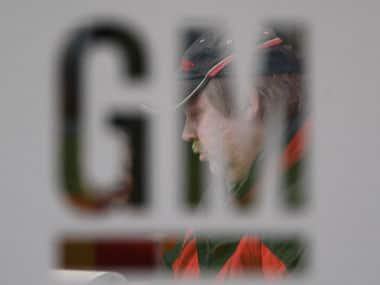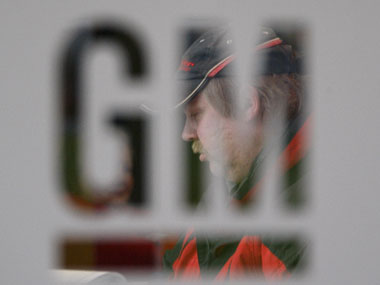New Delhi: Who all made a quick buck from the systematic fudging of emission data on Tavera MPV for eight years continuously?
General Motors India disclosed earlier this year that emission data was fudged by its officials for Tavera MPV manufactured between 2005 and 2013 and the Government thereafter launched a massive enquiry into this incident. But as yet, there are no clear answers about why this fudging was done, how could it go on for eight years undetected and most importantly, who benefitted by this malpratice within GM India or even within Government’s own testing agencies.
A senior official in the Ministry of Heavy Industries told Firstpost today that the ongoing enquiry is expected to nail beneficiaries from this scam. “The enquiry report is expected soon. We have asked them to find out who all benefitted by fudging emission data,” this official said.
But Lowell Paddock, the man who had to face uncomfortable questions over his predecessors’ pratices at General Motors India, says the company has “fixed everything” and is moving ahead. He declined to comment on who could the possible beneficiaries of this scam be, but asserted that alldiscrepancieshave been fixed and GM India is back on track.
“We have received type approval for Tavera BS III and production will restart in the next few weeks. Some days back, we have also addressed quality issues with the Sail hatchback. I do not have any comment on what happened or who benefitted, it was before my time,” Paddock, President and CEO of GM India, said.
Impact Shorts
More Shorts[caption id=“attachment_1084427” align=“alignleft” width=“380”]
 ho all made a quick buck from the systematic fudging of emission data on Tavera MPV for eight years continuously? Reuters[/caption]
ho all made a quick buck from the systematic fudging of emission data on Tavera MPV for eight years continuously? Reuters[/caption]
Meanwhile, the ministry official quoted earlier said the report, which is being prepared over the GM incident after a lot of research and questioning, will also provide a roadmap for overhaul of the entire vehilce testing system in India. “At present, ARAI has only 5-6 people available for testing vehicles. We need more people qualified for testing vehicles, more random checks on vehicles and the report will suggest ways of overhauling the entire system of vehicle checks we do at present in India”.
Jolted into action by the roller coaster events of the last two days, where as many as 1.14 lakh Taveras manufactured by General Motors since 2005 have by-passed established emission norms, the Government is now already speaking of a mandatory recall policy for vehicles.
Though General Motors would have us believe that it launched such a large voluntary recall on its own, it seems that someone from the company alerted the Ministry of Road Transport and Highways about several malpractices related to procurement of emissions certifications for the Tavera MPV model produced at its plant in India.
This complaint was forwarded to the Ministry of Heavy Industries, which then began examining the matter by forming a committee to probe the entire issue of vehicle testing, practices used and if the entire vehicle certification process needs an overhaul.GM got wind of the probe and then went ahead and announced a “voluntary” recall of vehicles which were manufactured and have probably been running on Indian roads for last eight years.
Heavy Industries Minister Praful Patel told Firstpost earlier his ministry is working on a mandatory vehicle recall policy to prevent recurrence of such instances in the future. “No one does anything voluntarily. A mandatory recall policy is needed,” the minister said when asked whether the current voluntary policy was not good enough.
Patel’s ministry may either suggest changes in the existing Motor Vehicles Act or draft a new law all together for mandatory recall of vehicles.
He had also said that though the GM incident appears to be isolated, this is a good time to look into the larger issue of quality control of vehicles being manufactured in India. “There seems to be a tendency to give approvals without rigorous testing,” he said referring to several global vehicle manufacturers who have set up manufacturing in India.
Since we in India tend to believe testing is more rigorous in European countries and USA, companies headquartered there are perhaps allowed more leeway when testing vehicles manufactured in India.
Speaking to Firstpost earlier, Transport Secretary Vijay Chhibber had pointed out that the GM incident is “not a question of standards (being inadequate) but of ensuring compliance with those standards. I am sure the Heavy Industries Ministry will look into it”. These questions need to be answered by the ongoing:
- How come GM was able to fudge emission data for eight long years without the company’s top management knowing about this? And what about complicity of Government officials or those from vehicle testing agencies like ARAI, NATRIP etc in certifying GM vehicles which did not comply with emission standards?
2) If the testing systems are inadequate, should we worry about critical issues like vehicle safety too? Also, how come no such cases from any other vehicle maker have come to light till now?
3) This may not be so much about faulty procedures as about standard operating procedures not having being followed.
Many companies claim vehicles are tested at several stages during the manufacturing cycle - by the company as well as through random checking by the regulatory and testing agencies.
It remains unclear if the company or any of its officials will face criminal action. Also, it remains to be seen if top management guys who no longer work with GM, also get sucked into the probe by the Government. A top official at the country’s homologation and certifying authorities said there is a structured process for testing and type approval which is being followed. “During normal production our guys pick up vehicles which are ready for dispatch for emission testing. This is a 20-year old procedure and also being used in European countries. Let MoRTH look into whether this procedure needs to be overhauled”.
Well, if an incident of bypassing emission norms is spurring a somnolent Government to overhaul the entire vehicle testing procedure, car makers should stop cribbing about it. In fact, we should thank our stars this is only about emissions and not a matter of safety of the occupants! And if mandatory vehicle recall is indeed coming, the industry should welcome it - they claim there is nothing to hide.
)